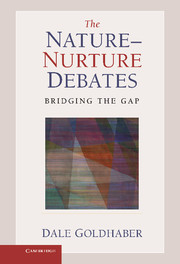6 - So What?
Published online by Cambridge University Press: 05 August 2012
Summary
One of the major – if not the major – points of this book is that the nature–nurture debate continues to be fought along two battlefronts and that these two fronts represent different levels of analysis, that is, different metatheories. One metatheory reflects a belief that the life sciences, including the study of human development, can best be modeled using the same principles as those that work so well for the physical sciences, that is, a belief that complicated phenomena can best be understood as reflecting the cumulative effects of several antecedents each acting essentially independent of each other. The design and use of methodology allowing for the partitioning of variance into independent main effects is consistent with this worldview.
Scholars working within this reductionist metatheoretical tradition, such as those involved in the classic debate, typically reject the notion that there is a metatheoretical value reflected in their work. Rather, they argue that as empirical researchers (whether the focus is on nature or nurture), they are simply capturing what there is to be found with respect to the causes of human development and, further, that their research methods are neutral, that is, if the data show that it is possible to partition nature and nurture, it is so because it is possible to partition nature and nurture, not because the methodology artificially creates such a result. And finding evidence for such main effects, they report them, to both the scholarly community and to the general public. And so people picking up their morning papers (or iPads, as might be the case), read that scientists have found the God gene (Wade 2009), that bad driving might be genetic (McHughen et al. 2010), that political orientation might be genetic (Alford et al. 2005), and of course that the poor may not only be poorer than the rest of us but in some way might be genetically different as well (Rowe 2005).
- Type
- Chapter
- Information
- The Nature-Nurture DebatesBridging the Gap, pp. 121 - 140Publisher: Cambridge University PressPrint publication year: 2012



